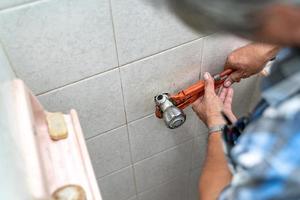Essential Bathroom Plumbing Tips Every New Homeowner Should Know
Essential Bathroom Plumbing Tips Every New Homeowner Should Know
Blog Article
This post listed below relating to Plumbing Tips for New Homeowners is seriously entertaining. You should take a look.

For new homeowners, understanding and preserving bathroom pipes can save both time and money by preventing expensive concerns down the line. Below are some crucial bathroom pipes pointers to aid you maintain whatever running smoothly.
Acquaint Yourself with the Key Shut-Off Valve
Knowing where the primary water shut-off shutoff lies in your house is critical. This permits you to quickly switch off the water in case of significant leakages or throughout plumbing emergencies, avoiding substantial water damage.
Frequently Examine for Leaks
Tiny leaks can lead to large issues. Regularly inspect under sinks, around toilets, and near plumbing fixtures for any indicators of leaks. Seek moisture, little drips, or corrosion. Catching and fixing leakages early can avoid a lot more major damage and conserve water.
Do Not Overlook Slow Drains Pipes
If your sink or bath tub is draining slowly, it's frequently a sign of a clog forming. Addressing this very early can protect against a full clog. Make use of a bettor or a plumber's serpent to remove particles. Stay clear of making use of chemical drainpipe cleaners as they can damage your pipelines gradually.
Know What Not to Flush
Toilets are not garbage disposals. Prevent flushing anything other than toilet tissue and human waste. Products like wipes, womanly hygiene products, and cotton bud must be thrown away in the trash to avoid clogs and sewer back-ups.
Mount Strainers in Drains
Location filters in your sink and bathtub drains to capture hair and various other debris before they enter your pipes system. Cleaning the strainers consistently will help avoid accumulation and maintain water moving easily.
Keep Your Hot Water Heater
Ensure your hot water heater is set to a suitable temperature (normally around 120 degrees Fahrenheit) to stop scalding and decrease energy usage. Flush the storage tank annually to eliminate debris buildup, which can reduce the efficiency and lifespan of your heating system.
Update Your Components
If your home has older components, take into consideration upgrading to much more efficient versions. Modern commodes, showerheads, and taps are developed to make use of much less water while providing excellent stress, which can substantially reduce your water bill and ecological footprint.
Be Cautious with Do It Yourself Plumbing Repairs
While it's alluring to take care of all home repair work by yourself, beware with plumbing. Some problems might call for expert proficiency, specifically if they include primary water lines or sewage system repairs. Employing a professional can often be extra affordable than do it yourself, particularly if it stops more damage.
Prepare for Cold Weather
Protect your pipelines from cold throughout winter by insulating pipes in unheated areas like cellars, attic rooms, and garages. During severe cold, allow cold water drip from faucets offered by exposed pipes to assist avoid freezing.
Arrange Routine Upkeep
Take into consideration organizing annual inspections with an accredited plumbing professional. They can identify issues that you could miss out on, such as surprise leakages or damage on pipelines and components. Routine upkeep helps extend the life of your pipes system and can protect against emergency situations.
Conclusion
Recognizing and keeping your home's bathroom pipes can stop numerous usual problems. By following these important ideas, you can ensure your bathroom stays functional and efficient, saving you money and time over time.
Essential Plumbing Tips for Homeowners: Keep Your Pipes Flowing Smoothly
As a homeowner, understanding the basics of your plumbing system can save you time, money, and a lot of headaches. Plumbing issues can range from minor annoyances like dripping faucets to major problems like burst pipes that cause significant damage. This guide provides essential tips to help you maintain your plumbing system and tackle common issues.
Understanding Your Plumbing System
Supply System: Brings fresh water into your home from a municipal source or a well. Drain-Waste-Vent System: Removes wastewater and vents sewer gases outside. Fixtures and Appliances: Includes sinks, toilets, showers, dishwashers, and washing machines. Basic Maintenance Tips
Regular Inspections: Periodically check for leaks, corrosion, and other signs of wear and tear. Look under sinks, around toilets, and near water heaters. Know Your Main Shut-Off Valve: In case of a major leak, you’ll need to shut off the water quickly. Ensure everyone in your household knows where the main shut-off valve is located. Prevent Frozen Pipes: In cold climates, insulate exposed pipes and let faucets drip during extreme cold to prevent freezing. Use Strainers: Install strainers in sinks and tubs to catch hair, food particles, and other debris that can cause clogs. Common Plumbing Issues and Solutions
Clogged Drains:
Prevention: Avoid pouring grease down the drain and use drain screens to catch debris. DIY Fix: Use a plunger or a plumbing snake to clear minor clogs. For stubborn clogs, a mixture of baking soda and vinegar can sometimes help. Leaky Faucets:
Prevention: Replace washers and seals regularly. DIY Fix: Turn off the water supply, disassemble the faucet, and replace worn parts.

Request Free Estimate Report this page